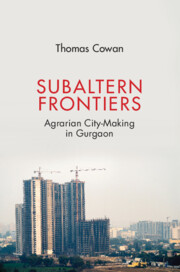Introduction: Antinomies of an Agrarian City
Published online by Cambridge University Press: 12 August 2022
Summary
A Tale ofTwo Cities
On the hot evening of 18 July 2012, the Maruti Suzuki automobile plant on the borders of Gurgaon, Haryana, was on fire. Earlier that day a supervisor had verbally abused an assembly-line worker, fights broke out with security guards, and 2,000 workers stopped production and set the factory alight. The Maruti Suzuki plant in Gurgaon's Industrial Model Township (IMT), Manesar industrial estate, is the largest car factory in India; producing two-thirds of all the cars in the country, the factory was the centrepiece of India's modern manufacturing prowess. By the morning of 19 July 2012, the factory was partially burnt out, hundreds of workers and management officials were in hospital and a supervisor was dead.
Maruti began life in the 1970s as a government-owned car manufacturer based in central Gurgaon, then a small agricultural town on Delhi's southern border. In 1983, with backing from Japan's Suzuki, Maruti produced India's first mass-consumer car (the Maruti 800 ‘people's car’) – a moment that anticipated imminent market liberalisation in the 1990s and the coming decades of mass urbanisation. Suzuki took control of the company in 1992 following India's economic liberalisation and by 2002 the Japanese conglomerate had a majority share. During that period Suzuki aggressively expanded production and iteratively reoriented the company towards flexibilised, lean manufacturing systems characteristic of contemporary globalised production regimes. By the late 2000s, Maruti Suzuki shifted production to a state-of-the-art industrial township – IMT Manesar – on the edge of Gurgaon, setting up shop in the largest factory in the country; boosting production output and restructuring the workforce, the factory became the country's engine of the future, a showpiece of globalised production and high-tech industrial prowess feeding the state's insatiable desire for rapid urban and infrastructural development. The fire marks a denouement in India's embrace of globalised flexible production.
The fire of course did not come out of nowhere. The factory had been embroiled in near-constant workplace struggles for over a decade. A year before the fire, in June 2011 both temporary and permanent workers at the IMT Manesar plant carried out strikes, tool-downs and occupied the factory on two occasions, costing the company over 200 million US dollars, dipping the company's market share while suffocating the complex supply chain that extends across the region.
- Type
- Chapter
- Information
- Subaltern FrontiersAgrarian City-Making in Gurgaon, pp. 1 - 42Publisher: Cambridge University PressPrint publication year: 2023



